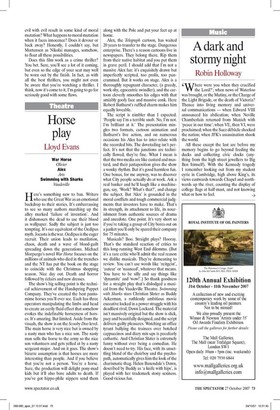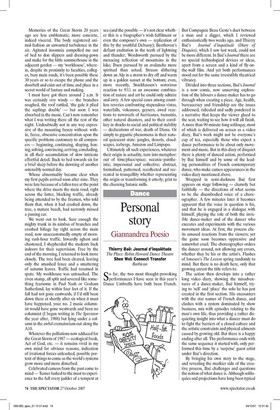A dark and stormy night
Robin Holloway G Where were you when they crucified the Lord?'; when news of Waterloo was brought, or the Mutiny, or the Charge of the Light Brigade, or the death of Victoria? Thence into living memory and universal communications — when Edward VIII announced his abdication; when Neville Chamberlain returned from Munich with 'peace in our time'; when VE, then VJ, were proclaimed; when the Suez debacle shocked the nation; when JFK's assassination shook the world.
All these except the last are before my memory begins to go beyond feeding the ducks and collecting civic clocks (anything from the high street jewellers to Big Ben himself). With the Kennedy tragedy I remember looking out from my student eyrie in Cambridge, high above King's, its views eastwards towards Chapel and northwards up the river, counting the display of college flags at half-mast, and not knowing what or how to feel.
Memories of the Great Storm 20 years ago are less emblematic; more concrete, indeed visceral. The body registered animal-fashion an unwanted turbulence in the air. Agitated insomnia compelled me out of bed to don slippers and dressing-gown and make for the little summerhouse in the adjacent garden — my 'workhouse', wherein, despite its proximity to faculties, colleges, busy main roads, it's been possible these 30 years or so to escape the phone and the doorbell and exist out of time and place in a secret world of fantasy and making.
I must have got there around 2 a.m. It was certainly very windy — the branches soughed, the roof rattled, 'the gale it plied the saplings double' — but soon I was absorbed in the music. Can't now remember what I was writing there all the rest of the night. Undoubtedly not in any way expressive of the mounting frenzy without: within, fierce, obsessive concentration upon the specific problems customary to all composers — beginning, continuing, shaping, honing, solving, convincing, arriving, concluding, in all their accumulation of slow intricate effortful detail. Back to bed towards six for a brief sleep before the dawning of another ostensibly normal day.
Whose abnormality became clear when my first pupils arrived soon after nine. They were late because of a fallen tree at the point where the drive meets the main road, right across the latter, blocking traffic, already being attended to by the firemen, who told them that, when it had crashed down, the tree, a mature beech, had narrowly missed a passing car.
We went out to look. Sure enough the mighty trunk in its nimbus of branches and crushed foliage lay right across the main road, now unaccustomedly empty of morning rush-hour traffic. Inwardly aghast and chastened, I shepherded the students back indoors for their supervision. Free by the end of the morning, I returned to look more closely. The tree had been cleared, leaving only the smashed fence and a smattering of autumn leaves. Traffic had resumed in spate. My workhouse was untouched. The riven stump, all split and severed like something fearsome in Paul Nash or Graham Sutherland, lay within four feet of it. If the fall had not gone eastwards, if I'd still been down there at shortly after six when it must have happened, your no. 2 music columnist would have gone westwards and been no columnist (I began writing in The Spectator the year after, 1988) but lying under a column in the awful crematorium out along the A10.
Whatever the palliations now adduced for the Great Storm of 1987 — ecological freak, Act of God, etc. — it remains vivid in my own mind for obvious reasons, indication of irrational forces unleashed, possible portent of things to come as the world's systems grow more and more disturbed.
Celebrated cameos from the past come to mind — Turner lashed to the mast to experience to the full every judder of a tempest at sea (and the possible — it's not clear whether this is a biographer's wish-fulfilment or even the composer's own — replication of this by the youthful Debussy); Beethoven's defiant exultation in the teeth of lightning and thunder; Wordsworth pursued by the menacing reflection of mountains in the lake; Ibsen pursued by an avalanche more spiritual than actual; Strauss slithering down an Alp in a storm to dry off and warm up in a golden sunset at the bottom; even, more recently, Stockhausen's notorious reaction to 9/11 as an awesome combination of nature and art he could only admire and envy. A few special cases among countless reveries confronting stupendous vistas, waterfalls, volcanoes, geysers, awed reactions to newsreels of hurricanes, tsunamis, other natural disasters, and to their corollary in shocks to social and political stability — declarations of war, death of Diana. Or simply to gigantic phenomena in their natural quiescent state: jungles, deserts, cloudscapes, icebergs, Amazon and Limpopo.
Ultimately all such experiences, whatever their origin in actuality, turn into metaphor: out of time/place/space; oceanic–pantheistic; impersonal and collective; abstract, formalised, patterned; recollected and recreated in tranquillity whether representing the origin or transforming it utterly; grist to the churning Satanic mills.



































































 Previous page
Previous page